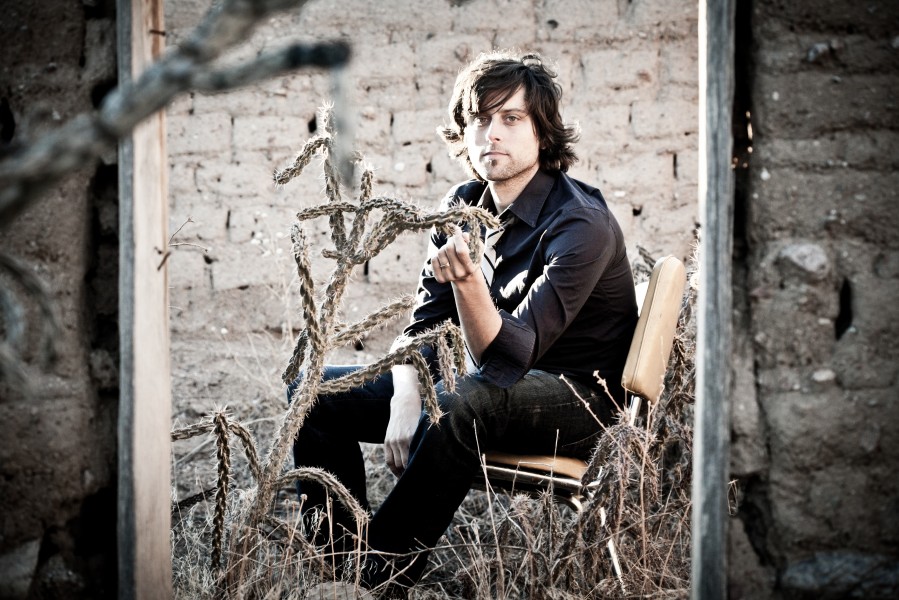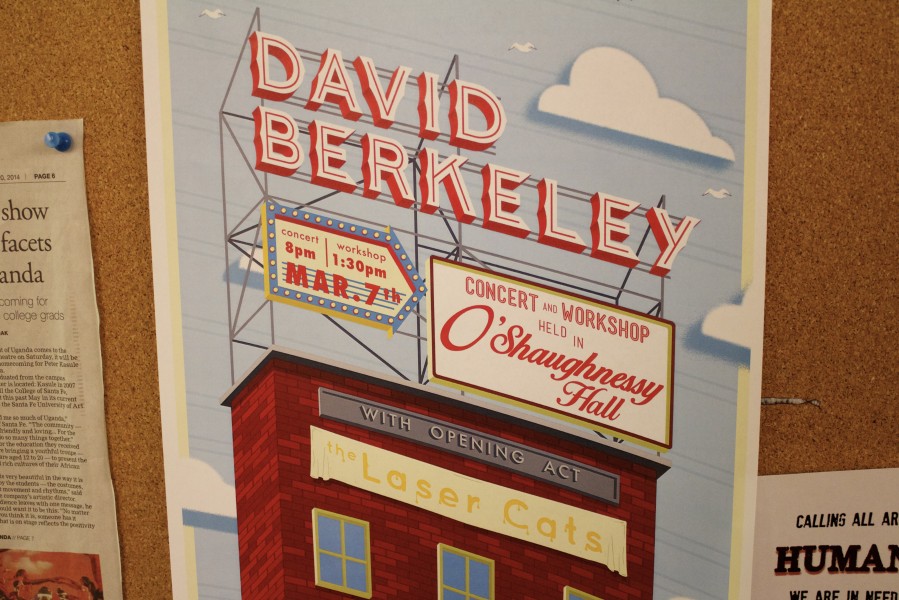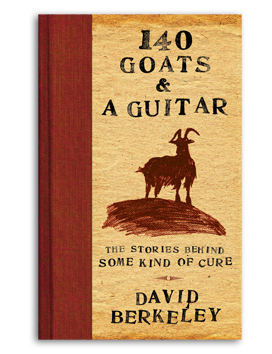Tags
Related Posts
Share This
Sing a Song, Tell a Story
“Ultimately, my family was sort of the saving grace for the fact that life was hard.”
“Music is, and I think will always be, this mystery to me.”
“There’s no reason why Santa Fe doesn’t have a really neat underground scene where we’re all seeing each other and supporting each other and collaborating and excited about what everyone else is doing…”
“If you just start singing real quietly, people shut up because they feel like assholes, as well they should. So the point is, talking can really bring the audience in sometimes.”
—David Berkeley
This Friday, March 17, singer, songwriter and author David Berkeley will conduct a two-hour workshop consisting of music discussion, lyric writing, song composition and the universal language of story. The same night, at 7:30 p.m., enjoy Berkeley in concert at O’Shaughnessy Performance Space, featuring an opening performance by SFUAD’s own Laser Cats.
Influenced by a roaming nature and patient heart, Berkeley’s songs have been called “lustrous and melancholy” by The New York Times, “graceful and resonate” by Creative Loafing, Atlanta and in a review from Three Chords and the Truth UK, Berkeley was said to have an “innate ability to wonderfully construct a song which masters the English language in both structural and metaphorical philosophy.” Boston Phoenix called him “the best of the young American songwriters.” Generally put, Berkeley’s music is a result of his early aspirations of travel writing mixed with a natural gift of vocals.
A native to New Jersey, Berkeley moved to Santa Fe more than a year ago with his wife and two sons and has since continued touring with projects like his 140 Goats and a Guitar, a publication of 13 essays corresponding to 13 original songs (inspired by his residency on the island of Corsica in France), and songs from his latest album, The Fire in My Head, inspired by the New Mexico landscape.
Read Berkeley’s Q/A for an inside look into the life of the successful songwriter and author.
Jackalope Magazine: Why the mix of songwriter and author?
David Berkeley: I think I got into song writing because of a love of language first, but I didn’t really try writing anything other than songs until relatively recently. Before I was a song writer I thought I wanted to be a travel writer. I’m from the east coast, but I lived out here and I worked for Outside Magazine as an intern. I guess I thought I was going to be some kind of writer but then music sort of took over.
I’ve always sung. That’s something I felt really passionate about and felt like was a gift that I had. I guess at some point it became a question of what I felt was the best means or medium for trying to articulate and express things, and being able to use my voice as part of that seemed like what I was suppose to do or should do. That doesn’t mean that song writing is easy for me. I think in some ways writing an article for a magazine would probably be easier for me than writing a song, but I think when I do it right, when I really can get out what I’m trying to, I pack a far more emotional punch than I can without music.
JM: What fueled the idea of your first book, 140 Goats and a Guitar?
DB: I spent a year living on the island of Corsica. At that time, when I was writing songs for that [album], they were coming out of these stories and experiences in Corsica. Also just being a new dad, it was just a lot of new things happening and it felt like the songs came out of pretty good stories because they were set in such an exotic place and I was particularly emotional as a father. And when I got back from Corsica, and I was performing some of the songs, I was telling a lot of these stories on stage. I always talk a lot on stage, but for the first time I had a set of real discrete tales that led into these songs and I really like that combination. I decided to try and write them down, to try and recreate the experience.
The book is basically 13 stories that set up the 13 songs on the [album]. The idea is that you read the story then listen to the song. You play with the two and see what you can find out about the song through the story or maybe vice versa.
JM: What about the second book you’re working on?
DB: I really liked touring [for the 140 Goats and a Guitar] project, but I felt a couple of things. On the one hand I felt like maybe I was revealing more than what I was comfortable revealing and also a lot of the theme of that book, I think, is that ultimately my family—my wife and my love for my kid—was sort of the saving grace for the fact that life was hard. Even in Corsica, which is beautiful, there was a lot of alienation I was feeling. A lot of loneliness. I think the recurring theme in the book is that love is what makes you able to endure.
When I was presenting it to audiences, I found myself occasionally feeling guilty because I would be reading and talking about how I was really lucky. I found myself realizing that a lot of my audience didn’t have that. So I was identifying the problems with the world, but my solution wasn’t universal, because there are some people who don’t have a partner and are just lonely. So that led to my new project, which is fiction and it’s 10 stories that weave together, all told in third person, then 10 songs that go along with those.
These stories, as opposed to being about how fortunate I am, are about how there are people in the world that don’t fit in and don’t find other people. They’re narratives of isolation and dislocation. Although, in general, I think I’m still am optimist. There are these points of connection, and I think you get this feeling from the book, because the characters all overlap, the stories all overlap, and sometimes the characters meet and sometimes it works out and other times they just narrowly miss, but I think you will get the feeling that there’s hope. These people, even though they’re lonely or slightly off, they all exist in the same world and even if they haven’t met they might meet and it might work out.
JM: When writing became more prominent in your art, was it a difficult/different to work in that world?
DB: I’ve been writing songs for a long time and I write very slowly so it’s a nice release to be able to not have my guitar and work with a language I know and speak. Even if I’m not a real accomplished writer, in some ways it feels like the weights are off because even though I’m more of a song writer, I know English.
Music is, and I think will always be, this mystery to me. I’m not a school musician and there are times where nothing comes and I can’t really harness what I’m trying to get or I don’t know what I’m trying to get. That happens with writing too, but not as much. So if I’ve got an idea for a song that I’m working on, I may go backwards, I may not go anywhere forwards, or I may not move at all. That might be a day where nothing happens. With writing I feel like that rarely happens. I might make changes that make things worse, but I feel like if I open up one of my stories to work on it, I have things that I clearly want to change and I’ll change them…and again it might not go anywhere but at least there is productivity and that I can’t always guarantee in music.
JM: What does Santa Fe offer to your work?
DB: Santa Fe doesn’t have the greatest live music scene. So that’s a challenge. Although I’ve lived in New York, the Bay area and Atlanta, I toured from all those places. So even if there was a great music scene, I would still tour. You have to play the markets if that’s what you’re doing and you have followings and you have to keep cultivating them.
I think, you have to find a space in order to be creative. Depending on where you live or what you’re doing, that can be easier or harder to find. For a while in New York, Brooklyn was really inspiring to me, I just liked the rush of it all. But I also really like the light here and the smells and the sky. I think one of the challenges of being an artist or whatever is being in your head a lot and alone in that way. So I think that cities are fun for that, because even if you are working on something you’re just bombarded constantly and literally with people and things and noise. I think that can cut back on the loneliness. If you harness it right it’s great, but it can also be a big distraction. You don’t have that here.
I think there’s a lot of potential here. I think maybe there is a little too much competition…but if we can get past that, I can see this place being very ripe for collective and a really supportive nurturing scene. To make anything significant, we need each other to build something that’s exciting as opposed to seeing who can get a gig at Second Street. Who cares? There’s no reason why Santa Fe doesn’t have a really neat underground scene, where we’re all seeing each other and supporting each other and collaborating and excited about what everyone else is doing and not seeing each other as competition…but thinking about building something where people actually want to come to Santa Fe. There are a lot of great artists here doing cool things.
JM: What will you teach in the workshop?
DB: My intention is to do a little talking about songs, and just to get people in the world. But then to really play with this idea of stories and songs and try and work out the benefits of each medium a little bit. I think that in doing that, we’ll learn about songs in particular, but also stories and what you can do with each or not do with each…I want to make it valuable to everyone, even if you aren’t a song writer. Hopefully there will be something to gain for all different types of people, because we’ll really be talking about creativity and expression.
JM: Tips on performing?
DB: I write fairly emotional material and relatively introspective serious songs. I don’t write a lot of jokey songs (though every now and then there will be an audience that cracks up at a line)…I think I like a full emotional experience as an audience member and I also think there is a human opportunity missed if you just go and play your songs and don’t communicate with your audience in any other way. I tend to talk a fair amount to both build a vibe and build the audience a little and also to balance out the heaviness of some of the material. I like being present and it’s weird to me to have a room full of people and have their attention and just sing your songs the way you would anywhere else. It’s a real experience. It’s happening in real time with a particular audience dealing with particular things.
With the first book, I was trying to strike a balance with giving people clues without being like. ‘this is what the song is about’ because I don’t want it to be that heavy-handed or prevent you from making the song your own. But I do think that in a live show it’s cool to let people in a little bit in mysterious ways. So maybe I’ll tell a story or say something and you’re not even sure what the relevance is, but then as you hear the song you’ll be like ‘oh, I get that now.’ Helping people to make discoveries.
It’s funny, sometimes the best way to get a noisy room to quite down and focus is just to talk to them and it’s the hardest thing to do if say you’re playing a noisy bar and no one is listening, to just tell a story. It might not work. It doesn’t always work. Sometimes, in a really noisy room, I’ll start singing off mic. A lot of people’s tendency is to be as loud as possible because it’s really loud in the room, but sometimes if you just start singing real quietly, people shut up because they feel like assholes, as well they should. So the point is, talking can really bring the audience in sometimes.









 Jackalope Magazine is the student magazine of Santa Fe University of Art and Design. Building on the interdisciplinary nature of our education, we aim to showcase the talent of our university and character of our city.
Jackalope Magazine is the student magazine of Santa Fe University of Art and Design. Building on the interdisciplinary nature of our education, we aim to showcase the talent of our university and character of our city.
Recent Comments